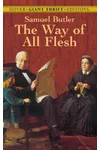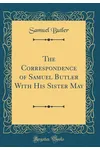Picture a Victorian-era Englishman who spun tales of machine consciousness and skewered societal norms with a sly grin—meet Samuel Butler! This novelist and critic dared to challenge the rigid conventions of his time, blending satire, science fiction, and autobiography into works that still spark curiosity today. From the utopian oddity of Erewhon to the raw honesty of The Way of All Flesh, Butler’s stories invite us to question everything.
The Making of Samuel Butler
Born on December 4, 1835, in Langar, Nottinghamshire, Samuel Butler grew up in a clerical family, steeped in the religious and intellectual rigor of Victorian England. His father, a clergyman, expected him to follow suit, but young Samuel had other ideas. After studying at Cambridge, he rebelled against a predetermined path, fleeing to New Zealand in 1859 to work as a sheep farmer. This bold move shaped his independent spirit, and while abroad, he began writing essays and sketches that hinted at his future literary flair.
Samuel Butler’s Unforgettable Stories
Butler’s breakthrough came with Erewhon (1872), a satirical novel imagining a society where machines are banned for fear they might evolve beyond human control. This prescient take on technology and consciousness was groundbreaking, blending humor with eerie foresight. His semi-autobiographical The Way of All Flesh (published posthumously in 1903) took a different tack, dissecting Victorian family dynamics and religious hypocrisy with unflinching honesty. Butler’s style—sharp, witty, and unafraid to provoke—set him apart. He also penned Erewhon Revisited (1901), a sequel exploring the fallout of his utopian world, and translated classic works like Homer’s Iliad with a fresh, accessible voice.
His writing often danced between genres, mixing philosophy, satire, and social critique. Butler’s fascination with evolution, inspired by Darwin, fueled his speculative ideas, while his skepticism of organized religion gave his work a rebellious edge. Whether poking fun at societal absurdities or probing the human condition, his stories remain timelessly thought-provoking.
Why Samuel Butler Matters
Samuel Butler’s influence stretches far beyond his era. Erewhon laid early groundwork for science fiction, inspiring later thinkers to explore artificial intelligence and technological ethics. The Way of All Flesh became a touchstone for modernist literature, influencing authors like George Bernard Shaw and Virginia Woolf with its raw psychological depth. Butler’s fearless critiques of Victorian hypocrisy and his visionary ideas about machines continue to resonate in our tech-driven world, making him a literary pioneer whose voice still feels fresh.
About Samuel Butler
- Born: December 4, 1835, in Langar, Nottinghamshire, England
- Key Works: Erewhon (1872), The Way of All Flesh (1903), Erewhon Revisited (1901)
- Died: June 18, 1902, in London, England
- Notable Trait: Challenged Victorian norms with wit and foresight
Ready to explore a world where machines might outsmart us or dive into a family saga that pulls no punches? Snag Erewhon or The Way of All Flesh and discover Samuel Butler’s brilliant, boundary-pushing stories!






















